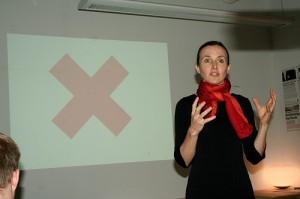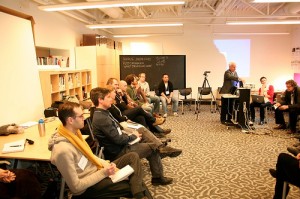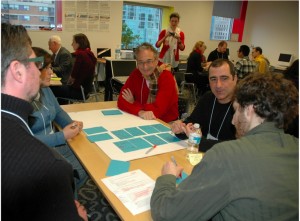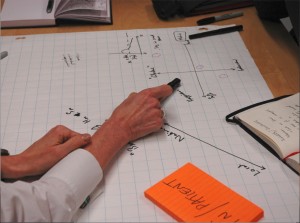On Wednesday November 19th we are convening a meeting of all stakeholders in xClinic+, an evolution of the original xClinic concept integrating more clearly the cultural change agenda of the project. Since the original charette (collaborative design) of 2010 the ideas underlying the project have evolved and the spectrum of interested persons has broadened. In addition a team of graduate students of the Strategic Foresight & Innovation program at OCAD University has explored various models for sustainable operations of xClinic. They will be presenting their findings at the meeting, which is being hosted by the Strategic Innovation Lab (sLab). If you are interested in joining the project you are welcome to attend the meeting. Attendance is free but seating is limited so you have to register on Evenbrite.
Posts Tagged ‘xCAMP’
xClinic Stakeholder Meeting
Tuesday, November 18th, 2014Design with Dialogue – Bodystorming
Saturday, March 20th, 2010Design with Dialogue (DwD) is a community of practitioners of facilitation and collaboration methods that meets monthly at the Strategic Innovation Lab at OCAD. DwD members were recently involved in facilitating collaborative design events at ChangeCamp and the XCLINIC‘s XCAMP.
DwD is inviting all who are interested in designing user experiences to a special session (additional to the monthly DwD meeting) welcoming Dennis Schleicher, Director of User Experience for Sears, to Toronto Tuesday, March 23 from 7-9 pm at OCAD’s sLab, room 600.
Dennis’ workshop will provide an introduction to the practice of Bodystorming as a method for engaging people in simulating experiences and processes by designing them through joint acting and improvisation of envisioned situations. Dennis has written about three forms of Bodystorming on his noteworthy blog site Tibetan Tailor. Guess which one he will do, and come prepared to play!
Attendance is free but you have to register here.
From Post-Copenhagen to Post-xCAMP
Tuesday, March 9th, 2010Natalie Jeremijenko, the founder of the xCLINIC was in Toronto to attend xCAMP. She was invited by OCAD’s Strategic Innovation Lab (sLab) to present her current research in the context of sLab’s Exploration series. She titled her talk “Post Copenhagen: What Strategies Now?” She argued that with the failure of the super-conference format of the Copenhagen negotiations, the emphasis now falls on other strategies and technological opportunities to raise the standard of evidence and coordinate a more diverse response to environmental challenges. She asked how can distributed sensing and public sharing of data reveal this evidence? How can it support and enable local organization and actions?And how can social networking be used in collective sense-making and life-style experiments to localize responsibility for environmental health?
Regardless how familiar you are with Jeremijenko’s work, you are guaranteed to discover something new and fascinating every time she speaks about her research. This well attended Explorations event was no exception and the ensuing discussion was the perfect preamble to xCAMP that immediately followed.
As organizers of xCAMP we were overwhelmed by and grateful for the interest and support extended to us. Participants brought an amazing scope of knowledge and experience to bear on the issues discussed at xCAMP. The agenda consisted of 3 main segments. In the first segment Natalie presented the xCLINIC concept and showed examples of her related activities. Then Carla Gould from the core organizing group presented a storyboard illustrating the “impatient’s” experience. She was followed by Nabil Harfoush, who took participants through xCLINIC’s foundational elements, their strengths and weaknesses, and proposed a framework for xCLINIC 2.0 aiming at establishing a movement around many xCLINICs.
The second segment consisted of an open circle discussion of the proposed concept followed by 5 break-out sessions that handled:
- The Starter Kit
- Creative Engagement
- Collaboration & Communications
- Alliances & Central Resources
- Benchmarks & Impact Measurements
The break-out sessions were facilitated by a wonderful team: Pam Purves, Greg Judelman, Ryan Coleman, Dan Rose, and Magda Wesolkowska, all of whom are colleagues and friends from the Design with Dialogue collective. We are grateful for their assistance and dedication.
The final segment (called Harvest) consisted of a “market place” type of exchange, where participants circulated among the displayed findings of the 5 break-out groups and added their thoughts and comments, a brief presentations by each group, and a general discussion about findings.
xCAMP generated a significant volume of ideas, solutions and activities road map, which were captured in a variety of ways including flip charts, sticky-note collections, photos and video recording.We have started the arduous task of processing all these outcomes and will be reporting on progress regularly.
Our plans call for establishing 5 permanent working groups to continue working on this project. If you are interested in participating send an email to xclinic@www.manara.ca with a description of your interest areas and degree of availability for participating in any one of these groups.
xCAMP Countdown
Wednesday, February 24th, 2010The concept of an environmental health clinic (xCLINIC) was created and implemented by Natalie Jeremijenko of New York University.
The concept approaches health from an understanding of its dependence on external local environments; rather than on the internal biology and genetic predispositions of an individual. It directs attention to root causes rather than symptoms. The idea is that by building awareness, initiating behavioral change through action, and ameliorating your own local environmental health, you improve the health of humans and improve the local environment around you. The more people who participate, the greater the cascading effects.
xCAMP is a gathering of practitioners across many disciplines to collaboratively evolve the concept and design the xCLINIC project.
The event is SOLD OUT. More details can be found here.
Post-Copenhagen: What Strategies Now?
Wednesday, February 24th, 2010Natalie Jeremijenko is an artist whose background includes studies in biochemistry, physics, neuroscience and precision engineering. She is a recipient of the 2008-2009 Van Alen Institute-New York Prize Fellowship in Sustainable Cities and the Social Sciences, and was recently named one of the 40 most influential designers by I.D. Magazine. She is an artist not-in-residence at the Institute for the Future (IFTF) in Palo Alto. Jeremijenko directs the xDesign Environmental Health Clinic at NYU, whose concepts are at the roots of our own xCLINIC project.
Her work is described as experimental design, hence xDesign, as it explores opportunities presented by new technologies for non-violent social change. Her research centers on structures of participation in the production of knowledge and information, and the political and social possibilities (and limitations) of information and emerging technologies — mostly through public experiments. In this vein, her work spans a range of media from statistical indices (such as the Despondency Index, which linked the Dow Jones to the suicide rate at San Francisco’s Golden Gate Bridge) to biological substrates (such as the installations of cloned trees in pairs in various urban micro-climates) to robotics (such as the development of feral robotic dog packs to investigate environmental hazards). Jeremjenko’s permanent installation on the roof of Postmasters Gallery in Chelsea Model Urban Development (MUD) provides infrastructure and facilities for high-density bird cohabitation in an environmental experiment in interaction with the New York City bird population.
Natalie will be in Toronto to attend our xCAMP, a “camp”-style session to collaboratively evolve and extend the environmental health clinic (xCLINIC) concept in Toronto and design its implementation. She will be presenting as part of sLab’s Explorations Series 1:30 – 3:00 pm on Thursday February 25th at sLab (Suite 600, 100 McCaul St.). Don’t miss this unique opportunity.



